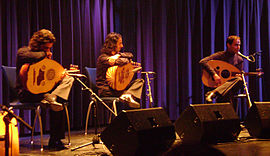Le Trio Joubran
| Le Trio Joubran | |
|---|---|
 Le Trio Joubran. Innsbruck 2008. From left To the right: Adnan Joubran, Wissam Joubran, Samir Joubran |
|
| General information | |
| founding | 2004 |
| Website | http://www.letriojoubran.com/en |
| Current occupation | |
Oud , singing |
Samir Joubran |
Oud, percussion
|
Wissam Joubran |
Oud, percussion |
Adnan Joubran |
| Accompanist | |
Percussion |
Yousef Hbeisch |
Le Trio Joubran is a Palestinian Oud - Trio . The three brothers have achieved international fame through their further development of Arabic folk music and their virtuoso playing technique.
history
The three brothers Samir (* 1973), Wissam (* 1983) and Adnan (* 1985) Joubran grew up in a musical family in Nazareth , in which playing the oud and especially the construction of this instrument had a long tradition that went back to the Great-grandfather of the Joubran brothers. The musician's father, Hatem Joubran, a well-known oudbauer, and the mother Ibtisam Hanna, a singer, began their sons' musical education at an early age.
Samir, the eldest of the three brothers, was the first to start his career with the albums Taqaseem (1996) and Sou'fahm (2001). He soon gained international fame for his virtuoso oud playing and began to work with other well-known artists, especially the poet Mahmud Darwisch . His third album, Tamaas , he recorded with his brother Wissam. At that time, Wissam Joubran had already earned a reputation as an instrument maker following the tradition of his family and was the first Arab student to graduate from the renowned Stradivari Conservatory in Cremona . Since then, the group has mainly lived and worked in Paris. Randana (2005) was the first record in a trio. Since Majâz (2008), the group has often been accompanied by the percussionist Yousef Hbeisch, also from Palestine.
music
A specialty of the Trio Joubran is the line-up: the oud is usually only used individually in Arabic music. The Joubran brothers successfully used three ouds together for the first time, reminiscent of the guitar trio of John McLaughlin , Al Di Meola and Paco de Lucía , which they also call their role models. They combine traditional maqam compositions with playing techniques influenced by Spanish-Arabic music and improvisations based on jazz . Wissam Joubran made the instruments required for the brothers' novel way of playing himself. Often these are custom-made products with additional bass strings.
Discography
Adnan Joubran
- Borders behind (World Village, 2014)
Samir Joubran
- Taqaseem (1996)
- Sou'fahm (2001)
Samir and Wissam Joubran
- Tamaas (Daqui, 2003)
Le Trio Joubran
- Randana (Smd Neo-di, 2005)
- Majâz (Smd Neo-di, 2008)
- A l'Ombre des Mots (CD + DVD, World Village, 2009)
- As Fâr (2011)
- Le Trio Joubran-the First 10 Years (CD + DVD, World Village, 2013)
Web links
- Le Trio Joubran. Le Trio Joubran, accessed November 2, 2008 .
- Wissam Joubran: Biography. Retrieved November 2, 2008 .
Individual evidence
- ^ Wissam Joubran: The “Joubranian” Oud and the history of the four generations. (No longer available online.) Archived from the original on June 12, 2008 ; accessed on November 2, 2008 . Info: The archive link was inserted automatically and has not yet been checked. Please check the original and archive link according to the instructions and then remove this notice.
- ↑ TRIO JOUBRAN - The universe of the Arabic sounds. (No longer available online.) Weltmusikwelt.de, archived from the original on July 1, 2007 ; Retrieved November 2, 2008 . Info: The archive link was inserted automatically and has not yet been checked. Please check the original and archive link according to the instructions and then remove this notice.
- ↑ Banning Eyre: Le Trio Joubran: Brothers of the Oud. Retrieved November 2, 2008 .
- ↑ Daniel Bax: Brothers in Spirit. taz , accessed November 2, 2008 .
- ^ Frank Schindelbeck: Trio Joubran. Retrieved November 2, 2008 .